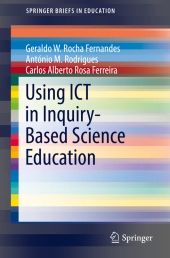 Neuerscheinungen 2019Stand: 2020-02-01 |
Schnellsuche
ISBN/Stichwort/Autor
|
Herderstraße 10
10625 Berlin
Tel.: 030 315 714 16
Fax 030 315 714 14
info@buchspektrum.de |

Geraldo W. Rocha Fernandes, António M. Rodrigues, Carlos Alberto Rosa Ferreira
(Beteiligte)
Using ICT in Inquiry-Based Science Education
1st ed. 2019. 2019. x, 97 S. 1 SW-Abb., 1 Farbtabellen. 235 mm
Verlag/Jahr: SPRINGER, BERLIN; SPRINGER INTERNATIONAL PUBLISHING 2019
ISBN: 3-03-017894-3 (3030178943)
Neue ISBN: 978-3-03-017894-9 (9783030178949)
Preis und Lieferzeit: Bitte klicken
This book analyzes the main Information and Communication Technologies (ICT) used in science education and the main theoretical approaches that support science education mediated by ICT in order to show how digital technologies can be employed in Inquiry-Based Science Education. It presents the results of a comprehensive review of studies focusing both on the use and effects of digital technologies in science education and on the different theoretical approaches that support the use of ICTs in science teaching.By doing so, the book provides a useful summary of the current research in the field and a strong analysis of its limitations. It concludes that there are few studies that report strategies and didactics for the practical use of ICT in science classes and that the use of ICT in science education can´t be seen as an isolated action without a theoretical basis to support it.
Based on these conclusions, the volume identifies the main ICTs used in inquiry activities, the main steps in inquiry activities used in science education and their approaches to the use of ICT. It shows that the use of ICT in Inquiry-Based Science Education allows students to develop more active work styles, improved attitudes towards science, better conceptual and theoretical understanding, improved reasoning, better modelling capabilities, and improved teamwork, along with improvements in other abilities.
Using ICT in Inquiry-Based Science Education will be a valuable resource for science teachers and science teacher educators looking for an introductory text that presents an overview of the scientific research analyzing the implementation of digital technologies in science teaching and that provides useful insights to all educators interested in using digital technologies to introduce their students in the world of scientific inquiry and research.
1 ICT-Based Science Education: Main Digital Resources and Characterization
1.1 Abstract
1.2 Introduction
1.3 Science Education and Digital Technologies
1.4 What are the main Digital Technologies (ICTE tools and digital resources) and how are they used to teach science?
1.5 How can science teaching and learning mediated by ICTE be characterized?
1.5.1 Science education and learning mediated by media and hypermedia technologies
1.5.2 Science teaching and learning mediated by virtual and remote laboratories
1.6 Conclusions
1.6.1 The integration of ICT in science teaching has positive effects when the students´ profile, the didactic aspects, and the teacher´s mediation are taken into consideration
1.6.2 The use of ICT is predominately characterized by active processes, which are student-centered rather than teacher-centered
1.7 References
2 Different Theoretical Approaches to The Use of ICT in Science Education
2.1 Introduction
2.2 What are the main trends in theoretical approaches for science education mediated by ICT?
2.3 How are the trends in theoretical approaches characterized in the context of science education mediated by ICT?
2.3.1 Approaches to teaching and learning through the use of ICT
2.3.2 Cognitive approaches
2.3.3 Approaches based on research, projects and case studies
2.3.4 Approaches that emphasize conceptual knowledge
2.4 Conclusions
2.5 References
3 Inquiry-Based Science Education: Characterization and Approaches for Use of Information and Communication Technology
3.1 Abstract
3.2 Introduction
3.3 The origins of the inquiry-based approach and inquiry activities in science education
3.4 Establishing the boundaries of IBSE
3.5 The main ICT tools used in inquiry activities
3.5.1 Inquiry activities that use hypermedia, multimedia, and the Internet
3.5.2 Inquiry activities that use simulations and simulation software
3.5.3 Inquiry activities that use virtual laboratories
3.5.4 Inquiry activities that use laboratories and remote data
3.5.5 Inquiry activities that use computer games and serious games
3.5.6 Inquiry activities that use multi-user virtual environments (MUVEs)
3.5.7 Inquiry activities that use computer-assisted instruction (CAI)
3.5.8 Inquiry activities that use specific resources: photographs, videos, wikis and chats
3.5.9 Inquiry activities that use mobile technologies
3.6 The main steps in inquiry activities in science teaching and their approaches to the use of ICT
3.7 Conclusions
3.8 References


